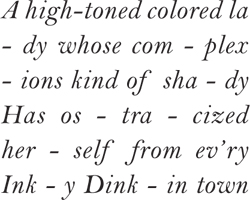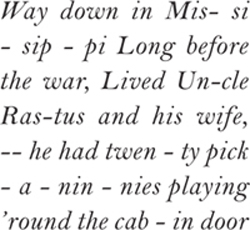Counternarratives (33 page)
Authors: John Keene

COLD

I
t's fastest, someone
once warned you, when you let go. Here, in the sweltering dining room, you recognize
no one, not a soul. Your mother took her supper at the usual hour and has already
returned to her room. When you've come with her before or alone you've usually
spotted at least one familiar face, from the City, or Philly, or Baltimore, since
from June through the first turning of the leaves people arrive every weekend from
all over. Like several other hotels in Catskill, Miss English's has welcomed you,
your mother, almost all who'll pay, permitting stays without incident. There have,
however, been a few: whenever one of them who has no clue about how the subtler
rules this side of the Mason-Dixon line function, how the law sometimes falls on the
other side. There was that time in the hotel on Kauterskill when you were asked to
vacate your room and move to the other wing because the Carolinian took grave
offense that you shared the same linens and dishes, that you might brush against his
wife in the hallway or stairwell, as if you could not walk a straight or even angled
line away from her, as if you had no will, as if you ever cast a second glance at
her or any white woman, and that hotel's owner, a round, pasty little man with a
voice like a duck call had said that he wanted to avoid any trouble, please just
go, he'd throw in a free whiskey as consolation. That afternoon in what felt like
a stupor you had packed up and settled into your new chamber over here, from which
you could see the creek and the mountains instead of your previous ampler river
view, the one you'd reserved half a year in advance, and you fumed for a while until
a bar, oh yes Lord, then the full song belled in your head and you spent the entire
afternoon in bed scoring it. Even here you know better than to linger when the
dancing begins or challenge one of them on the tennis court. The New Yorkers, city
dwellers or upstaters, native or immigrant, do not so much as blink when they see
you, staring mainly at the cut of your full dress suits and shoes, your mother's
elegant's day ensembles and summer gowns, as if viewing an exhibit. Only one or two
of them has ever known whom they were looking at, or, for that matter, uttered more
than a simple slur.

The surface appears tranquil, beware the undertow. The tanned hand
slides the bowl of soup beneath your chin. You return what feels like a smile but
almost isn't. Vichysoisse. For the last month or two, or five, has it been yearâwhy
can you not remember?âthese newest melodies you cannot flush from your head, like a
player piano with an endless roll scrolling till infinity. Songs have always come,
one by one or in pairs, dozens, you set them down, to paper, to poetry, like when
you took the solemn melody of the spiritual Rosamond was whistling as you walked up
Broadway and in your head and later on musical paper clothed it in brand new robes.
Then somewhere along the way after the first terrible blues struck you tried to hum
a new tune, conjure one, you thought it was just exhaustion, your mind too tired to
refresh itself as it always had, that's why the old ones wouldn't go away. A few
memory games, like rambling inside the rooms of your vast mental castle on the Nile,
as you called it and the one song that resulted from it, filling each one with
various quilts of harmonies from throughout your life, the sound of an engine
starting, horses galloping up the road, boat horns from the direction of the Hudson:
keys to release you from the musical bondage, from any of a thousand things you spot
and listen to as you stroll up 136th Street, all the conversations, personal or
overheard, hymns, ditties, stomps, work songs, quadrilles, cakewalks, rags. None of
those could dispel these new ones until they did, then more appear, stuck as if a
band has struck up the opening notes to the
Black Four Hundred
in your
skull and decided to keep playing it forever . . . we have your trials here below,
what's a poor brother to do? You fear you can sometimes hear the upper octaves
combining toward a crescendo that, soon as you open your mouth, might explode.

Close your eyes and lay your head back. For a few seconds you recline in
your seat, suppressing a cry, rise, eyes shut, after only a few spoonfuls. Your
fingers trace canons around your temples. You should head up to your mother's room
and tell her that it's getting worse, again, let her minister to you, she used to
know how to calm you down with words, a touch, Mrs. Isabella, he's rattling on about
something can't no one understand, settle what between your ears only once in a
while back in the day became a racket. You should hurry to the phone in the alcove
and have the operator connect you to Rosamond or his brother Jimmy, your big sister
down in Atlanta, call Aida Walker or Bert Williams, whose traveling schedule you
can't remember though you wrote down the dates in your notebook, even Erlanger or
Klaw, at least leave word for them all, it wouldn't take that long for someone to
drive up or hire a car or take the elevated to Grand Central and be here before the
night is out. Fact is you should not have told the attendants at the Manhattan State
Hospital for the Insane you were free of the interminable internal bellowing, you
should not have assured them you'd be fully in Mrs. Isabella's care, that the
tempest of those songs had died down, these ones like January storms that grind on
all through the morning and evening, so persistent and fortissimo at times you can
feel them chattering like piano hammers along your crown. As you stand at the table
you recall that moment when you couldn't stop caterwauling them, sometimes you're on
the floorboards, how the neighbors banged on the walls, the front door, gathered on
the stoop as they came and carried you downstairs, saying, “Mr. Cole, you
alright?”â“poor thing, you know he wrote the âThe Girl With Dreamy Eyes'”â“I'ma pray
for the man, er'rybody can see how bad off he is”â“my sis saw his Sambo Girls
Company in Hartford and just keeping them in line's what broke him in two”â“Inky
Dink sold his soul to you know who to line them damn pockets” . . . all those
comments tipped with interest, yes, and cheek, contempt twinned with compassion, to
the accompaniment of that sonorous, infernal drone. Devil's arias, you penned them.
Showfulls. In your twenties it had all flowed so easily, you'd sealed the deal, the
singing, the wisecracks, the dancing, all those godforsaken songs, that cooning and
crooning minstrelsy copping a mountain of green in return, concreting a vision of
you, of all of you in their heads, your own, the nigger who could do no wrong with
the Creole Show, the All Star Show and later Black Patti's Troubadours, before you
turned it inside out again, alone and with Rosamond, his brother Jimmy, these songs
unlike the previous ones, these were yours, nothing to feel the slightest pang of
shame about, any colored person could whistle them without a pause, did whistle them
as you heard yourself on the
IRT
. So easily, until these
newest ones, undreamt, unsummoned, sonic suns blasting behind your eyes, these
terrible samplings of the old and the unfamiliar. You should have told the
attendants how your agent and the publishing firm's representative had said in
almost the exact same words about your newest pieces, “Bob, what has gotten into
you, these notes together don't make any melodic or harmonic sense,” how the
arranger had cackled with reproach, “Cole, you have
four or five different
polyrhythms running concurrently, no man can play this,” how Rosamund himself
whispered, this side of sorrow, as he clasped your hand, “Bob, this mess on the
other side of sound.” Everyone began to train the same look on you, the bank
cashier, the postman, the barber, the Bajan shoeshine, the tiny boy black as a crow
with the crowbar who cranks cars for a cent on Lenox, the humpbacked begger guarding
the curb hollering, “Mister, you need my help?” as you sat there on the front steps
trying to massage the rondos out of your brow, your sinuses, your freshly trimmed
and pomaded locks, trying to express them outâ“Mister, you need me to call somebody?
Excuse me, officer, but I think that gentleman sitting over there humming and crying
to himself need. . . .”

Allow the foliage below an easy embrace. You mop your forehead free of
the film of sweat the August heat has pasted there, wipe the dew from your chest's
silver curls, crumpling the napkin beside the untouched knife and fork. Somehow the
heat down in Mississippi, Georgia, Florida, like this interior clamor, has followed
you north, everyone around you is fanning themselves, reclining on benches or
couches, already displaying like the underarms of your violet linen suit the dark,
wet badges of the season's relentlessness. Your mother, no stranger to heatwaves,
has taken to afternoon naps in the still silent dark. Bad as it is up here, though,
it's worse, you know, far worse down in Manhattan. You gulp down a glass of water
warmer than the soup, polish off a second soon as it's poured. Sometimes the songs
make you so dizzy you forget where you are, you've tried every manner of patent
medicine, the one that tastes like licorice and the one that tastes like silver, the
one that's made from coal ash and the one that's made from pine resin, neither
whiskey nor gin nor cocaine nor hemp nor hashish does the trick, you can't easily
get your hands on opiumâonly sleep, morphine and the unknown dulling potion the
orderlies provide temporarily blot it out. Then soon as you stir you're back at this
internal concert, on stage again inside your head as Willy Wayside, performing with
Billy at the Standard in Kansas City, twirling that mahogany cane and jigging at the
Pekin and Savoy in Chicago, only without the corked mask and zinced lips and red wig
and patchwork coats and satin lapels and tails and popped top hat and tap shoes
polished to the consistency of glass and the orchestra, without the after-parties
and champagne breakfasts, without the evening ending and you being able to sleep a
whole night through, without these notes pealing into bedlam nobody knows, why did
you ever write them, who did you write them for, yourself
and
them, more
them than you you did not want to, do now dare to admit, these songs still reeling
and unreeling, unreal, daily, hourly, by the minute, in you, your head, and you
can't, simply cannot, can no longer bear it.